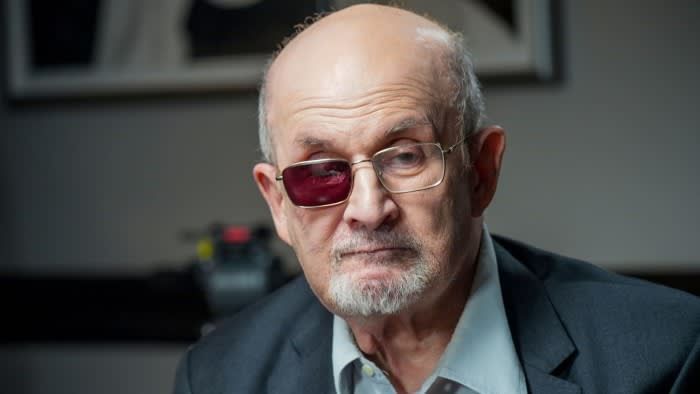Salman Rushdie: Through a Glass Darkly review — BBC interview gives an unsparing account of knife attack

Get free access to the Editor's Digest
Every week, Roula Khalaf, who is the current Editor of the FT, picks out and shares her most preferred stories via this newsletter.
When Salman Rushdie was confronted with a knife-wielding man at a public speaking event in New York State in August 2022, he immediately recognized the gravity of the situation. After all, he had been living in anticipation of an attack since the Islamic Republic of Iran issued a fatwa for his assassination 33 years earlier, in response to his controversial novel The Satanic Verses. Despite the potential danger, Rushdie remained calm and composed in the face of the attacker's aggression. He felt oddly detached from the situation, almost as if he had been expecting it all along. However, thanks to the quick thinking and actions of the event attendees, Rushdie was ultimately spared from harm. This close call serves as a reminder of the ongoing danger that Rushdie and other writers face when they challenge societal norms and religious beliefs through their work. Nevertheless, it is important that we continue to explore controversial topics and push the boundaries of free expression, even in the face of adversity.
Despite being left with blindness in one eye and paralysis in one hand, the author remains courageous and unbroken. In a moving interview with the BBC called "Salman Rushdie: Through a Glass Darkly", he reflects on the horrific incident and its painful but ultimately affirming aftermath. Through both his conversation with Alan Yentob and excerpts from his new memoir, "Knife", Rushdie recounts the brutal attack that took 27 seconds but had been building for thirty years. He does not hold back in his telling of the story.
Rushdie experienced a horrific attack where he was cut from his face to his throat to his thigh. He was conscious during this brutal assault and remembers being covered in a large amount of blood. In order to stop the bleeding, someone even inserted their thumb into his neck wound. His eye was so badly damaged that it was described as looking like a soft boiled egg. Yentob visibly winced at this description. Despite his extreme injuries, Rushdie was more worried about finding his house keys than his own well-being. Later on, he realized that this was because he had a strong will to survive and return home.
However, he recognized that his desire to protect himself wouldn't have been enough without the incessant endeavors of the physicians who reconstructed him. He recounts the unpleasant memories of getting retinal stitches, utilizing saliva extractors and catheters with a combination of dark humor and discomfort. Additionally, his wife, Eliza played a vital role in his recovery. He concludes that the power of love was ultimately more dominant than any negative energy.
What caused this strong dislike? How did it grow and spread in the attacker, who only seems to know the author's work through others? Rushdie wants to find out and move on. He cannot talk to his attacker face-to-face, so he creates a frank dialogue between them using digital animation and advanced software. The result is strange but shows great strength - the person who tried to silence Rushdie now communicates through his words.
Sometimes during the show, Rushdie talks to his younger self, and the interview is mixed with archive clips that give more information about his career that could have risked his life. He is still very bold like he was before. Rushdie thinks that language is a tool to reveal the true nature of things. He mentions to Yentob that if he was in a tough situation, he too would be tough like a knife fight.
You can catch tonight's episode of BBC2 at 9pm and if you missed it, don't worry, you can watch it now on iPlayer.



















































